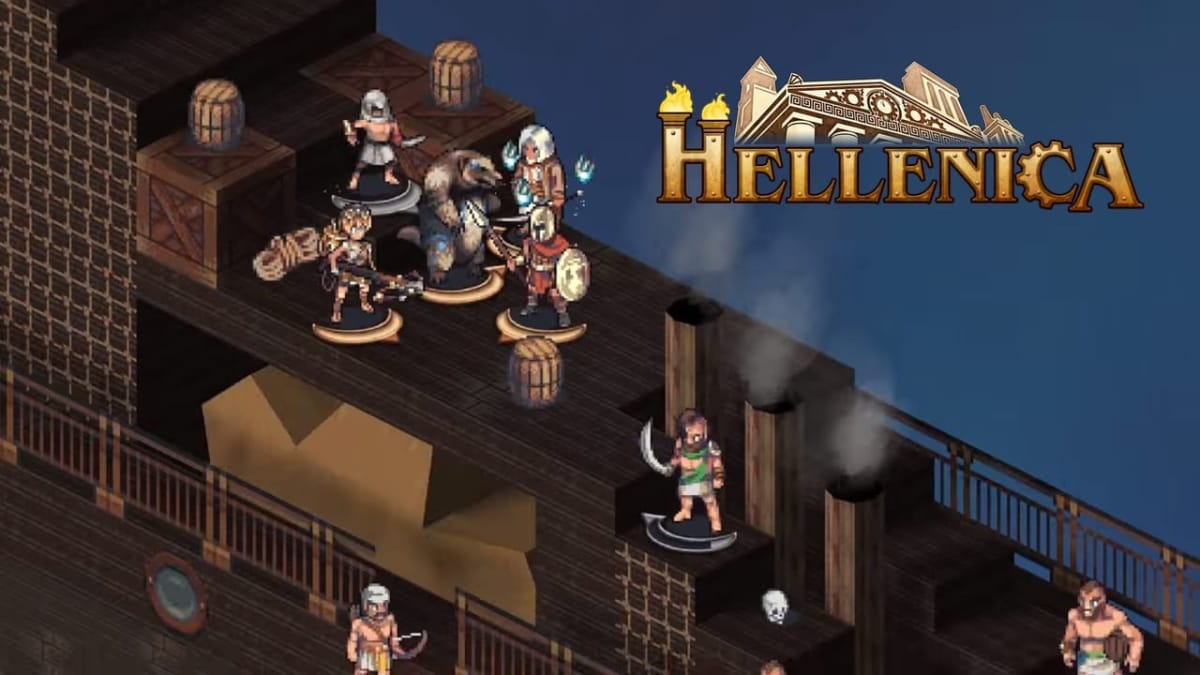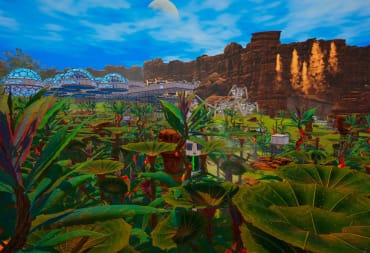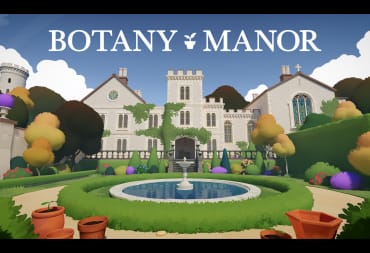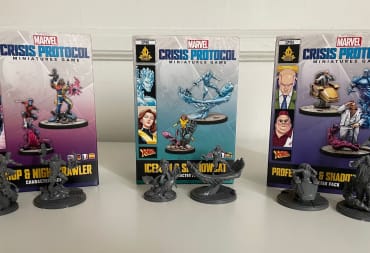Tactical RPGs are plentiful on handheld devices and many are amazing examples of the genre like the Tactics Ogre and Fire Emblem franchises. However, even with the multitude of games in this genre, rarely do we receive a traditional isometric tactical RPG on the PC that also feels well optimized for keyboard and mouse play. This is where indie developer The Dragonloft comes in and utterly surprises me with Hellenica, an ancient Greek epic with a steampunk twist.
Given a task by Artemis, a priestess named Diona must set out to uncover a looming threat to the whole of Greece. A typical plot for a game set in ancient times, but we soon learn things aren’t as cliché as they first appear. Diona immediately meets with the rambunctious and naïve inventor, Nephele. Unlike the more primitive looking Diona, Nephele is suited up with a personal size boiler attached to a crossbow and accompanied by an outfit decorated with gears. The two end up traveling to an Athens of old upgraded with trains and gear powered lifts, and it is here where we get our first taste of the unique setting of Hellenica.
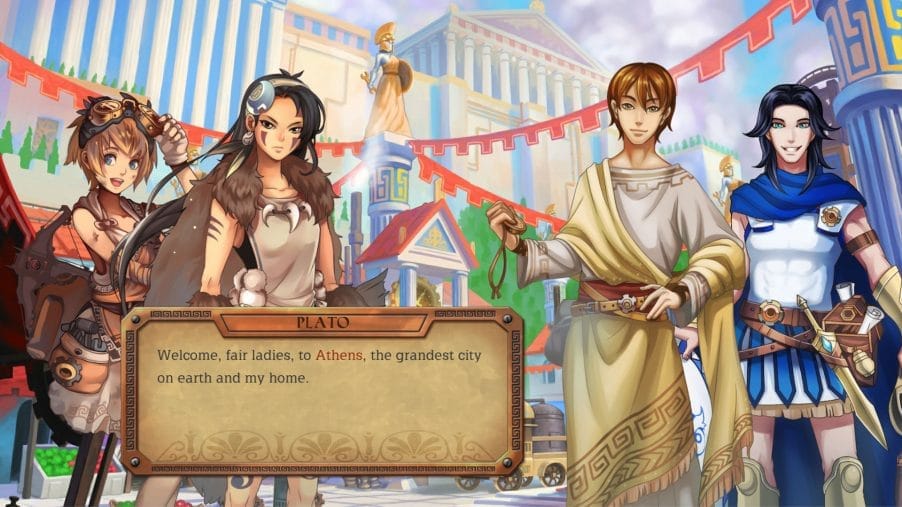
Hand drawn in a Western anime style, the cityscapes and characters are impressive on the eyes with designs that make them unique and memorable. From the glistening white of Athens, to the rundown pirate’s cove of Crete, and even to the gloomy, waterlogged ruins of Corinth, each of these destinations help define the tone of the subplot you are unraveling. The art in combat is also impressive, though I have some qualms. The sprites are charmingly nostalgic, similar in design to games like Tactics Ogre: The Knight of Lodis. The cityscape battles are fantastic, with moving platforms, statues, and gears all perfectly integrated with ancient looking building and wooden triremes. However, for all of the picturesque city scenes, there are also many battlefields set in nature that do not feel as well fleshed out, particularly the ground textures and water. These aren’t deal breakers, but compared to the cityscapes, it feels like less time was put into making them flawless. The water features are also a bit of a letdown, as there are so many dynamic pieces to the environment in the cities. In nature, the rivers and waterfalls are completely stagnant. The dynamic environments are not the only source of uniqueness in Hellenica, as the shifting decisions of the spidering plot also serve to change up the tradition tactical RPG formula.
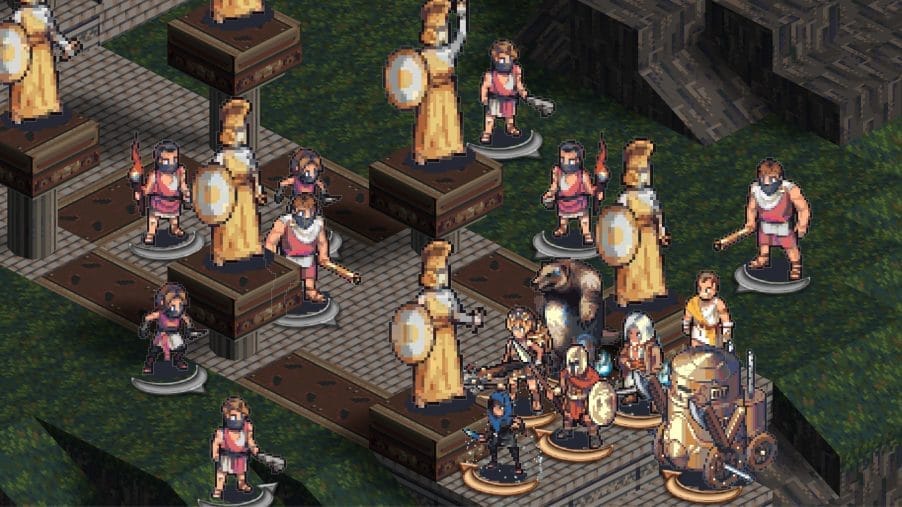
I wasn’t sold on the branching storyline to start, but it ended up being the aspect of Hellenica that left the biggest impression on me. Typically, I would rather play through a fleshed out linear narrative than several underdeveloped stories, but what this game does with its branching story is more about revealing different perspectives on the puzzling main plot rather than having separate plots altogether. These subplots are discovered through dialogue options in each of the hubs the character will visit along the way and it’s important to really read and remember conversations. The information you garner could not only help you make informed decisions in your current subplot, but also in separate playthroughs. Using all of this information, you travel through Greece and beyond helping people along the way by finding a lost brother to starting a coup, all in the pursuit of discovering what Artemis’ cryptic message was warning of. It is actually in the main plot, as opposed to the branching stories, that I find my first real problem with storytelling in Hellenica.
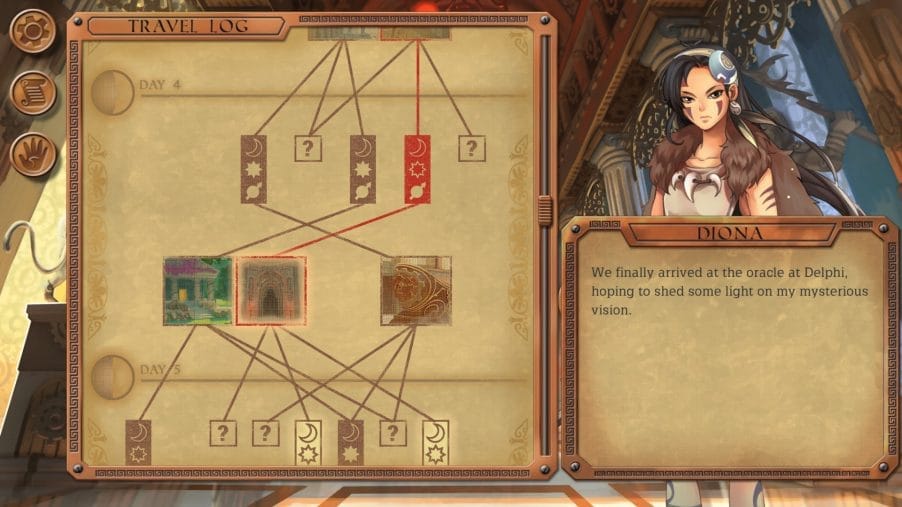
The subplots were filled with memorable characters and experiences, but the main plot is wrapped up quite abruptly at the end. Though not a requirement, the game suggests that you discover the six critical paths within the web of decisions you can make during your journey. Once you end up finishing a unique sub-plot, you have the choice to proceed to the main plot or, through a ham-fisted explanation, return to an earlier point in the story to explore different decisions and find new sub-plots. If you proceed, you have a series of five or so confrontations that end up with your defeating the true antagonist of the game.
My biggest qualm is that, especially on the coattails of some well-written subplots, you get to the final battles and stop feeling like you are progressing the story, but rather the story is being forced upon you and would continue with or without your character. In some ways you could reason that this is a decent plot device because as you’re trying to interpret the will of Artemis, Greece isn’t just sitting back and doing nothing, forces are working towards the end regardless of you. In the end, you are more of a distraction to the enemy so that these forces can work together without being interrupted. This is something I might have been okay with, as I don’t play tactics games for a power fantasy. However, I feel that the last moments of the game undermine all the importance of the aforementioned work done by the unified Grecians by unceremonially shifting the focus back onto the hero.
The story, which was entertaining and left the perfect amount of mystery, ultimately felt like it suffered from being split on what it wanted to be. Is this a story of strategy and coalitions in the style of The Illiad? Is it a narrative about the wit and escapades of a hero and their crew like The Odyssey? This lack of unity in storytelling was what disappointed me in the end, but what will stick with me for much longer are the characters and stories that did hit the mark, which was most of them.
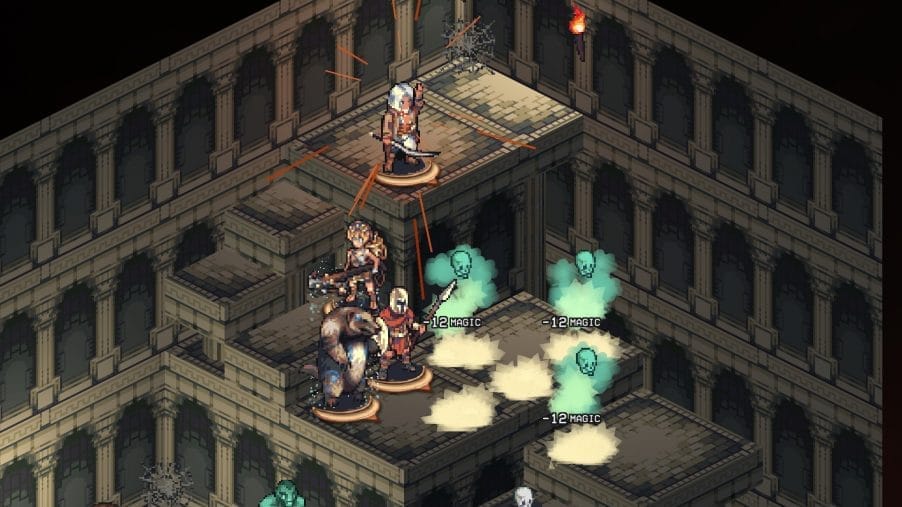
Outside of the storytelling, the gameplay was also well refined for the most part. It is no stretch to say this is mainly a bog standard tactical RPG in the style of the Tactics Ogre series, but Hellenica utilizes the fact that it is a PC game rather than a handheld experience to its advantage. Firstly, it achieves this through level design and manipulation of the isometric viewpoint. Like most games in this genre, Hellenica uses an isometric view to observe the battlefield, but unlike many games, you can manipulate the angle you view the battlefield by turning on a 90-degree angle. Typically, this wouldn’t matter in a traditional tactical RPG, but the developer uses the fact that you can change the view angle to hide variables from the player. For example, in one battle you are fighting your way up a spiral tower and if you don't turn the screen around to view the battle from all angles, you will surely miss enemies that could flank your units. This choice to design levels around the ability to view the battlefield at different angles adds depth to an otherwise dull combat system. On the topic of level design, the developers also focused on varying elevation and dynamic environments as essential part of combat.
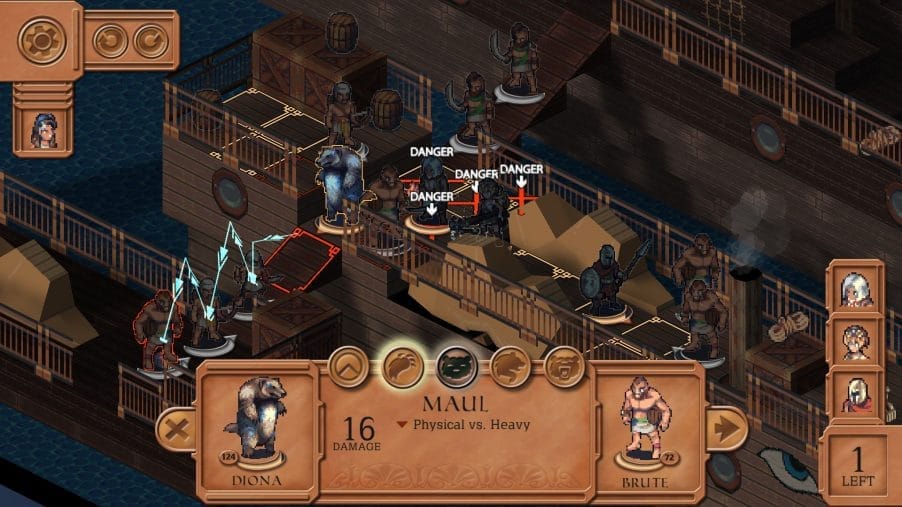
Many tactical RPGs allow units to hit people off ledges or gain an attack boost when attacking from higher ground, but Hellenica takes this much farther. Instead of focusing combat on throwing units at the enemy in the hopes that your units do more damage than theirs, this game focuses its combat primarily around throwing and pushing units off cliffs or into other enemies. This makes positioning and team synergy much more crucial than in other tactical RPGs. The cost of poor positioning in traditional games is taking a few extra hits and maybe losing a unit if your positioning is really poor. In Hellenica, even a slight misstep in positioning could have you protagonist being pushed off stairs, landing on your archer, and possibly killing both of them. Falling is just one environmental hazard, and these other hazards in combination with the dynamism of the environment make positioning even harder.
Considering that this is a steampunk world, it's only natural that there are steam pipes and cogs littered across most environments. If you throw or push someone onto these hazards (or if someone does it to you), the assaulted unit will take heavy damage. What makes these hazards even more dangerous is that they can operate moving platforms and other moving parts of the environment, and activating them can leave your units separated from the main squad. I could see this combat style getting gimmicky in other games, but because Hellenica is based around pushing and throwing being one of the primary forms of damage. This mechanic transcends gimmicky and becomes essential because it is designed to be the path of least resistance.
This environment focused combat made the core gameplay loop much more exciting than a more traditional system; however, this is not to say there are no issues with it. The first issue I had was with the selective nature of the dynamic environments. Unlike the constantly shifting platforms in cities, other elements lacked the same degree of dynamism. In theory, throwing someone into a waterfall should send them all the way down it or at least move them and do damage, but this isn’t the case. For some reason, water in Hellenica is one of the few stagnant parts of the map, so throwing people into rivers ends up being anticlimactic. Similarly, you would think throwing someone onto the top of a giant cog that's constantly turning would send them flying to the other side of the cog and do damage in the process, but this also isn’t the case. Unlike with water, these cogs are moving and that would imply that people couldn’t just stand on top of them, but if you throw someone on there, that is exactly what they’ll do though taking some damage from being there. The second issue I had was with the RPG progression.
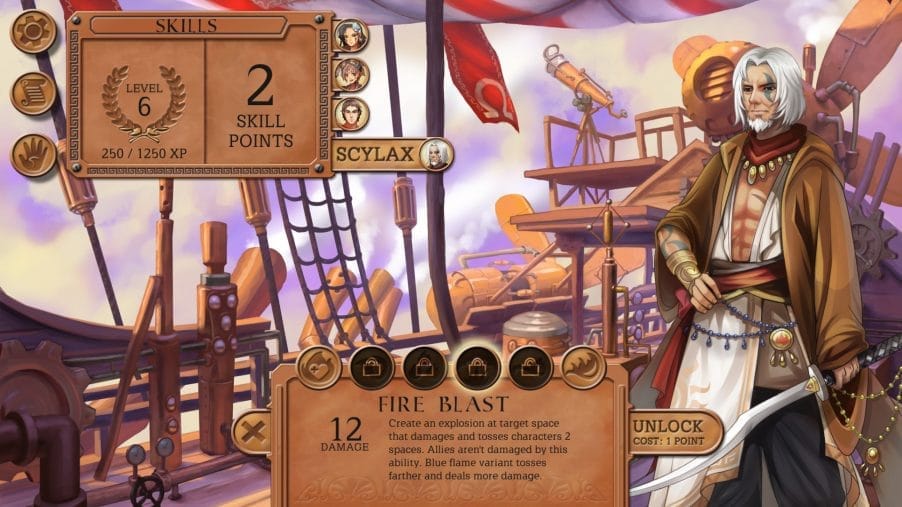
Leveling up is quite standard, as you level up your team and receive points to spend that unlock skills similar to Final Fantasy Tactics. However, the issue is that the abilities themselves are also fairly generic and thus come into contrast with the unique elements of the gameplay. For example, your archer can get a skill that does a slightly stronger attack, an attack that knocks a unit back a space, a similar knockback ability that also knocks you back, an area of effect ability, and a trap ability that does huge damage to an enemy that steps on a specific space. Because the game is focused on using the environment to your advantage rather than dealing damage yourself, the three abilities that provide neither pushing nor maneuverability come into conflict with the basic game mechanics. You could argue that by combining pushing with powerful trap abilities that ranged units possess would be a sound strategy, except it's easier to just push that same unit off a ledge and has the same if not better effect.
Hellenica provided a formulaic tactical RPG on the surface, but it was in the twists that this game really succeeded. Between the sublime artwork, unique environment focused combat in conjunction with shifting elements in the level design, and the memorable characters, this game has a lot to offer a fan of the tactical RPG genre. This is not to overlook its problems with an unfocused ending, random stagnant parts of the environment that should be dynamic, and skills that are in disharmony with the core game mechanics. Even so, Hellenica became a game that I would go back to and mess around with much in the same way I go back to the classic tactical RPGs on the Playstation, Game Boy, and DS.
Hellenica was reviewed on PC via Steam with a code provided by the developer.
Review Summary
An entertaining tactical RPG reminiscent of genre defining games like Tactics Ogre with a strategic twist of levels and combat designed around dynamically shifting environments. Though it lacks refinement in ground textures and an abrupt and unfocused end to the main story, Hellenica is carried by its unique combat and memorable characters.
(Review Policy)Pros
- Unique combat focused on throwing enemies and pieces of the environment
- Dynamically shifting environments
- Beautiful artwork
- Memorable characters
- Well written and engaging subplots
Cons
- Ground textures are a bit choppy in nature battlefields
- Rivers are stagnant despite the dynamic shifting of other elements
- Ending of the main plot is abrupt and unfocused
- Skill progression is lackluster
Have a tip, or want to point out something we missed? Leave a Comment or e-mail us at tips@techraptor.net
